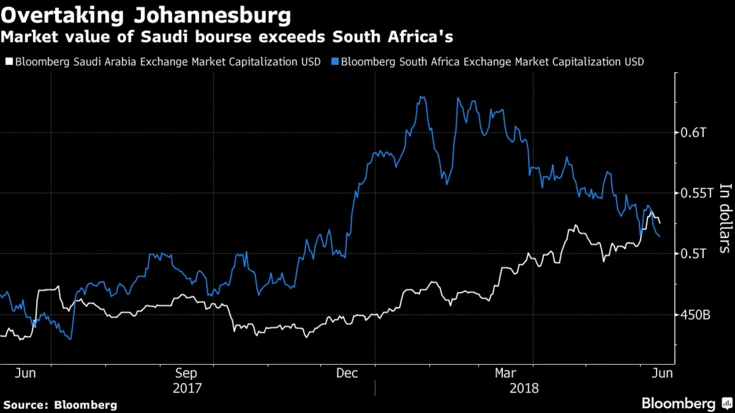
Partner Article
Islington Associates Zurich Switzerland: MSCI Win Bets Make Saudi Stocks Even Pricier Than New Peers
Emerging-market investors need increasingly deeper pockets as they prepare to add stocks from the region’s largest exchange.
Saudi Arabian shares have climbed 14 percent this year, partly as foreign investors bet the country will win upgrades to emerging-market status, which they expect to trigger billions of dollars of inflows from funds tracking global benchmark indexes. The buying has pushed the capitalization of Riyadh’s market beyond that of South Africa in dollar terms for the first time in 11 months. As the gains pile up, Saudi stocks have become increasingly more expensive than the group the country is poised to join.
Saudi Arabian shares have historically traded at a premium to the average for emerging markets, with access largely restricted to local investors until three years ago. But Saudi price-to-earnings estimates for the next 12 months are near the widest gap over developing countries since 2015. Index compiler MSCI Inc. will announce a decision on whether to add the kingdom to its emerging-markets indexes on June 20, while FTSE Russell made the call in March and will implement it next year.
“After the recent rally, I’d be cautious on going into Saudi on a broad basis,” said Osama Alowedi, head of investment management at GIB Capital LLC in Riyadh. “Valuations are already on the higher side, and growth potential is not so high to justify this. Dispersion in valuations is very high, especially for candidates that are expected to have large inflows from index inclusion, with many of them already trading at high levels.”
While expectations around the results of index inclusion are widely positive, the optimism isn’t matched in the Saudi economy. Gross domestic product shrank 0.7 percent in 2017, mainly as oil production dropped, while non-oil sectors grew 1 percent, according to the International Monetary Fund. The government is attempting to pare its budget deficit by reshaping one of the world’s most-generous welfare systems and is seeking to spur foreign direct investment that last year slumped to a fifth of 2016 levels.
Estimated price-to-earnings ratios for the benchmark Tadawul All Share Index have been above the 50-day average for most of 2018, while the same measure for the MSCI Emerging Markets Index has traded below it. Chemicals and steel manufacturer Saudi Basic Industries Corp. and lender Al Rajhi Bank, which are expected to see the biggest inflows following an MSCI upgrade as they comprise almost a quarter of the local stock gauge, both trade at more expensive levels than emerging-market peers.
“If you think about fundamentals, and you see where the market is trading, investors should be a lot more selective and go for bottom-up names,” said Alowedi. He remains bullish about banks, “where valuations are still attractive,” and about consumer stocks, set to benefit from a recovery in household spending.
Investors also need confidence that Saudi companies can achieve the ambitious earnings expectations set by analysts, to justify paying current share prices. While analysts have been cutting their average earnings estimate for Saudi companies over the past month, after sending it to a two-year high in early May, it remains higher for the year and that may be too optimistic.
Saudi companies haven’t met profit estimates for at least a decade, according to data compiled by Bloomberg. Yet, current projections require a 26 percent jump in earnings by June 2019. The Tadawul All Share Index rose 0.3 percent in Riyadh on Tuesday.
As markets anticipate an MSCI upgrade, “valuations have gone so much ahead of fundamentals,’’ Aarthi Chandrasekaran, vice president at Shuaa Capital, said in an interview with Bloomberg TV. “I’m sure there will be a cool-off period post the decision announcement, when valuations will start catching up more with reality on the ground.’’
This was posted in Bdaily's Members' News section by Krystal Kim .








 Why investors are still backing the North East
Why investors are still backing the North East
 Time to stop risking Britain’s family businesses
Time to stop risking Britain’s family businesses
 A year of growth, collaboration and impact
A year of growth, collaboration and impact
 2000 reasons for North East business positivity
2000 reasons for North East business positivity
 How to make your growth strategy deliver in 2026
How to make your growth strategy deliver in 2026
 Powering a new wave of regional screen indies
Powering a new wave of regional screen indies
 A new year and a new outlook for property scene
A new year and a new outlook for property scene
 Zero per cent - but maximum brand exposure
Zero per cent - but maximum brand exposure
 We don’t talk about money stress enough
We don’t talk about money stress enough
 A year of resilience, growth and collaboration
A year of resilience, growth and collaboration
 Apprenticeships: Lower standards risk safety
Apprenticeships: Lower standards risk safety
 Keeping it reel: Creating video in an authenticity era
Keeping it reel: Creating video in an authenticity era